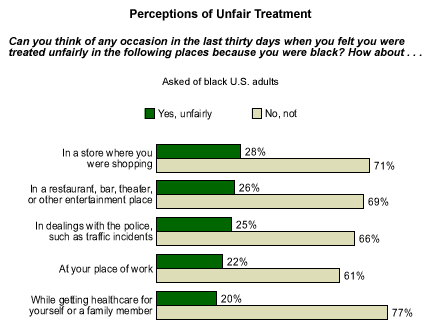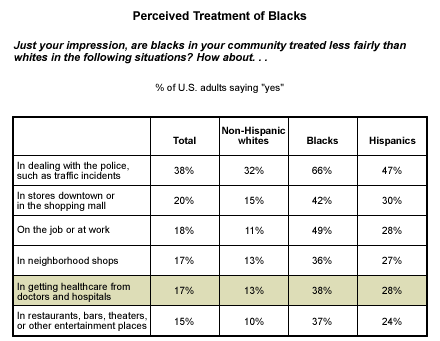Are black Americans less likely than people of other races and ethnicities to receive fair treatment when obtaining healthcare for themselves or for their family members? According to the recently completed Gallup Minority Rights and Relations poll*, one in five (20%) blacks feel that during just the past 30 days, they were treated unfairly in a healthcare situation because they are black.
That finding reinforces a 2002 Institute of Medicine (IOM) report that stated that blacks often "get second-class care," and concludes that there is a real divergence in the quality of care delivered to racial and ethnic minorities compared with the care that whites receive. According to the report: "The real challenge lies not in debating whether disparities exist, because the evidence is overwhelming, but in developing and implementing strategies to reduce and eliminate them."

Blacks are not alone in their perceptions that they are treated unfairly. The Gallup Poll also finds that 17% of all Americans feel that doctors and hospitals treat blacks in their communities less fairly than whites. When given a list of six situations and asked whether blacks in their communities are treated less fairly than whites, Americans rate dealings with the police as the most unfair, with 38% of U.S. adults believing this happens in their communities. In each of the five remaining situations, between 15% and 20% of Americans feel blacks are treated less fairly than whites.
The opinions of whites and blacks diverge markedly in the extent to which they perceive unfair treatment of blacks in their communities. Among black respondents, 38% say that blacks in their communities are treated less fairly than whites when obtaining healthcare, while only 13% of whites hold this opinion. Hispanics fall in between at 28%. A similar pattern holds true for each situation examined.

When it comes to the question asking blacks if they have personally experienced discrimination in the past 30 days, healthcare is not the item about which blacks report the most unfairness. However, it is important to note that several of the situations included in the question are situations that people are likely to experience more frequently than interactions with healthcare professionals. Many people do not see a doctor in a typical month and would therefore be less likely to report unfair treatment in that context. Blacks were more likely to report recent unfair treatment at stores or in restaurants or other entertainment establishments -- places that most people visit at least once each month.
According to the IOM report, the fact that blacks tend to have lower incomes than whites do is one of the reasons why blacks are receiving unfair treatment. The Gallup Poll results support this conclusion -- the lower the income bracket, the more likely a black respondent is to perceive unfair treatment by health professionals. Four percent of blacks with annual household incomes of $75,000 or more report unfair treatment by doctors and hospitals, compared with 34% among those with incomes of less than $20,000. This strong link between income and perceptions of unfair treatment does not emerge quite as strongly (if at all) for the other situations examined, such as in restaurants, at work, or when shopping, suggesting that healthcare workers' perceptions of a patient's ability to pay for services may play an important role in these quality-of-care disparities.
Bottom Line
The IOM report to Congress concluded that there is strong evidence that the inferior health treatment provided to blacks leads to higher death rates from HIV/AIDS, cancer, and heart disease. The IOM also finds that there are a variety of issues that need to be addressed to ameliorate existing disparities in the quality of healthcare, including time pressures on physicians, provider bias against minorities, language barriers, and even the location of healthcare institutions.
*The results are based on telephone interviews with a national sample of 2,250 adults, aged 18 and older, conducted June 9-30, 2004. For results based on this sample, one can say with 95% confidence that the maximum margin of sampling error is ±5 percentage points. In addition to sampling error, question wording and practical difficulties in conducting surveys can introduce error or bias into the findings of public opinion polls.
For results based on the sample of 816 non-Hispanic whites, aged 18 and older, the maximum margin of sampling error is ±6 percentage points.
For results based on the sample of 801 blacks, the maximum margin of sampling error is ±8 percentage points.
For results based on the sample of 503 Hispanics, the maximum margin of sampling error is ±8 percentage points. (164 out of the 503 interviews with Hispanics were conducted in Spanish.)